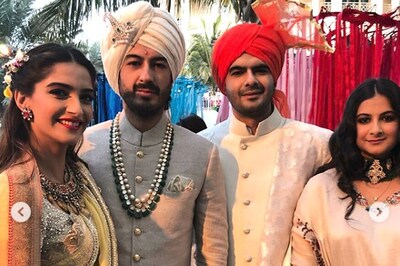
views
In his Vijayadashami speech, RSS Sarsanghchalak Mohan Bhagwat pointed out that terms like “deep state”, “wokeism”, and “cultural Marxism” are currently under discussion. He declared that these concepts are enemies of all cultural traditions. He further warned us that the complete destruction of values, traditions, and what is considered virtuous and auspicious is part of this group’s modus operandi.
He went on to categorically list the various steps through which cultural traditions are attacked. The first step, he stated, is to bring the mind-shaping systems and institutions of society under one’s influence. The education system, educational institutions, media, and intellectual discourse are prominent examples. This is done to undermine the thoughts, values, and beliefs of society through these channels. In a society that coexists, an identity-based group is motivated to separate based on its actual or artificially created specialities, demands, needs, or problems, fostering a feeling of victimhood among them.
In the final step, by fanning discontent, the identity-based element is pulled apart from the rest of society and made aggressive against the system. Direct conflicts are created by identifying fault lines within society. Furthermore, an atmosphere of anarchy and fear is fostered by intensifying distrust and hatred towards the system, laws, governance, and administration. This makes it easier to establish dominance over the country.
In the limited space we have, let us concentrate on ‘wokeism.’
What is Wokeism?
“Woke,” in its basic meaning, simply referred to being awake to the malaises and problems around oneself. It was ostensibly rooted in a noble effort to correct pervasive injustices. For instance, we can argue that the founding fathers and the framers of the Constitution were aware that our society urgently required the pillar of social justice, which they enshrined in the Constitution.
However, ‘wokeism’ became a perversion when it transformed into a tool of disunity wielded by cultural Marxists. Societies and nation-states cannot be envisioned based solely on equality and justice; they require fraternity and unity. In fact, the greatest champion of social justice, Dr Bhimrao Ramji Ambedkar, stated, “I want all people to be Indians first, Indians last, and nothing else but Indians.” Dr Ambedkar made a pertinent point by subsuming the ideals and practices of equality and justice within the broader context of fraternity and unity.
The adherents of ‘wokeism’ do not subscribe to such positive views. They attack the cultural traditions of Bharat, claiming the traditions only create and promote injustice. They condemn our family system, labelling it as “patriarchal,” criticise our festivities and rituals, and go to great lengths to disparage everything Bharatiya, branding it as “orthodoxy.” ‘Wokeism’ is not interested in unity; rather, it seeks fragmentation. It wishes to undermine any attempts at reconciliation and harmony by breaking society and individuals into infinitesimal pieces based on their identities. The adherents of ‘wokeism’ do not embrace unifying concepts like humanity, the human race, Planet Earth, or Hindus. Instead, they focus on dividing individuals based on their gender, creed, caste, class, colour, and so on.
Our Worries and Challenges
Since the threats of Marxism and Macaulayism have already captured our education and cultural institutions since 1947, significant damage has been done. It will take years for course correction. Let us examine some evidence.
Have we noticed how certain narratives become particularly visible during specific times of the year, such as Diwali, when debates over the use of firecrackers, pollution, and climate change flare up? Consider, for example, the involvement of organisations like PETA during certain festivals. While the intentions behind animal welfare advocacy are noble, this approach can be divisive. Such campaigns create a binary narrative where one must either be ‘woke’ and oppose traditional practices or be labelled as regressive and insensitive. This polarised approach contributes to a growing “my way or the highway” culture that threatens to undermine the fabric of Indian society.
Now, consider the rationale behind celebrating Mahishasur Martyrdom Day. When did a few individuals in Bahujan communities start identifying with the Asuras? A cynic might argue that this movement is driven by a handful of indoctrinated students at Jawaharlal Nehru University (JNU) and a few propagandists masquerading as public intellectuals. But is it really so? Those who make such arguments need to understand the gravity of the situation. They must realise that if someone at JNU becomes convinced that they are an Asur and that Maa Durga is merely “a Brahmanical conspirator,” the implications of this belief will not stop there.
Moving on, while freedom of expression is a fundamental right, it is also essential to strike a balance that prevents the misuse of media and digital platforms to spread divisive narratives. Reasonable restrictions come to mind immediately. Consider some of the content we watch on OTT platforms, the jokes of stand-up comedians, and other forms of entertainment. Have we ever seen content that is typically framed as freedom of expression promoting unity and harmony?
Way Ahead
We need to adopt a conservative approach. Conservatives are not merely those who look to the past; they are individuals who engage with the present, learn from history, hesitate, and gradually evolve. Indian parents can conduct a simple test with their children: ask them why someone is poor. If their social understanding reflects views such as “Brahmin = rich, evil, oppressors” and “Hinduism = greed, deception, oppressive myths,” then the bell is ringing loud. It is time for a course correction.
Dr Mohan Bhagwat, as a guardian, has alerted us to the pitfalls of being swayed by Western constructs of disunity and disharmony. We should not forget that the West lives very much amongst us through the threats of Marx-Macaulay, and they will do their best to always disunite Hindus and Bharatiya people. As Diwali approaches, we should examine when someone starts discussing climate change and declining air quality without proper context. Dr Ambedkar’s mantra of “Educate, Agitate, and Organise” could be immensely useful in countering and defeating the new Ravanas in Bharat. These individuals pretend to be crusaders for social justice but are, in fact, forces of disunity and disharmony. At times, they celebrate Mahishasur as a martyr, while at other times, they raise slogans such as “Tum jitne Afzal (Guru) maroge, har ghar se Afzal niklega!”
The author is MPA, Columbia University, New York and former OSD to Chief Minister at Government of Chhattisgarh. He tweets @ujjwaldeepak. Views expressed in the above piece are personal and solely those of the author. They do not necessarily reflect News18’s views.




















Comments
0 comment